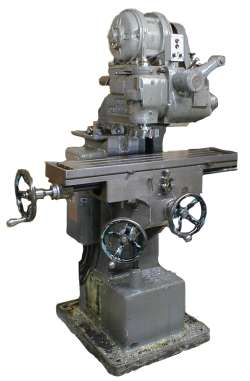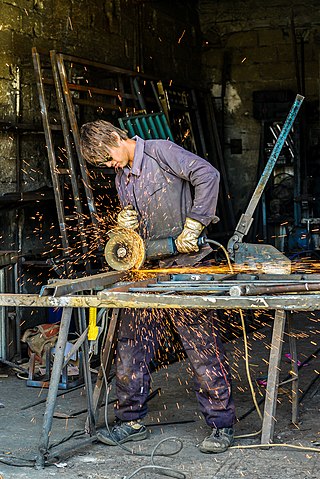
A power tool is a tool that is actuated by an additional power source and mechanism other than the solely manual labor used with hand tools. The most common types of power tools use electric motors. Internal combustion engines and compressed air are also commonly used. Tools directly driven by animal power are not generally considered power tools.

A machinist is a tradesperson or trained professional who operates machine tools, and has the ability to set up tools such as milling machines, grinders, lathes, and drilling machines.

Machining is a process in which a material is cut to a desired final shape and size by a controlled material-removal process. The methods that have this common theme are collectively called subtractive manufacturing, which utilizes machine tools, in contrast to additive manufacturing, which uses controlled addition of material.

Allgemeine Elektricitäts-Gesellschaft AG was a German producer of electrical equipment. It was founded in 1883 by Emil Rathenau as the Deutsche Edison-Gesellschaft für angewandte Elektricität in Berlin.

ZF Friedrichshafen AG, also known as ZF Group, originally Zahnradfabrik Friedrichshafen, and commonly abbreviated to ZF, is a global technology company that supplies systems for passenger cars, commercial vehicles and industrial technology. It is headquartered in Friedrichshafen, in the south-west German state of Baden-Württemberg. Specializing in engineering, it is primarily known for its design, research and development, and manufacturing activities in the automotive industry and is one of the largest automotive suppliers in the world. Its products include driveline and chassis technology for cars and commercial vehicles, along with specialist plant equipment such as construction equipment. It is also involved in the rail, marine, defense and aviation industries, as well as general industrial applications. ZF has 168 production locations in 32 countries with approximately 165,000 (2022) employees.
Ludwig Loewe was a German merchant, manufacturer, philanthropist and a member of the Reichstag. Loewe's companies became involved in the production of armaments, employing famous designers and creating notable guns.

The Renk GmbH is a German global manufacturer of transmissions, engines, hybrid drive systems, vehicle suspension systems, plain bearings, couplings, and testing systems. The company builds special gearboxes for tanks, frigates, icebreakers, and industry and is a leading supplier of running gear and damping systems for tracked and wheeled military vehicles. Renk is headquartered in Augsburg and in addition to its headquarters, also manufactures in Rheine, Hanover, Winterthur, Bath, and Sterling Heights.

Netphen is a town in the Siegen-Wittgenstein district, in North Rhine-Westphalia, Germany. It lies on the river Sieg, roughly 7 km northeast of Siegen.

Demag was a German heavy equipment industrial group whose individual companies are now scattered. The Demag name can be today found for example as the Demag Cranes and Components and Sumitomo (SHI) Demag.
Gleason Corporation is a prominent machine tool builder based in Rochester, New York, US. It has manufacturing plants in the US, Britain, India, China, Switzerland and Germany, and sales offices in those and additional countries.

The cylindrical grinder is a type of grinding machine used to shape the outside of an object. The cylindrical grinder can work on a variety of shapes, however the object must have a central axis of rotation. This includes but is not limited to such shapes as a cylinder, an ellipse, a cam, or a crankshaft.

Metabowerke GmbH is a manufacturer of power tools for professional users headquartered in Nürtingen, Germany. The company was founded in the 1920s and got its name from a hand drill, the so-called "Metallbohrdreher". Today, Metabo offers a wide range of power tools. The company is owned by the American investment firm Kohlberg Kravis Roberts & Co.

The Van Norman Machine Tool Company was an American machine tool builder from late in the 19th century until the mid-1980s. The company was based in Springfield, Massachusetts, USA. Its main areas of focus were milling machines and grinding machines. The company was acquired by Universal American Corporation during the early 1960s. Universal American later merged with Gulf and Western Industries.

Grinding is a type of abrasive machining process which uses a grinding wheel as cutting tool.

The Sächsische Maschinenfabrik in Chemnitz was one of the most important engineering companies in Saxony in the second half of the 19th century and the first two decades of the 20th century. Including its various predecessor businesses, the firm existed from 1837 until its liquidation in 1930, and individual branches of the company taken over by others continued to operate until 1990. The company is closely linked with the name of its founder and long-time manager, Richard Hartmann, whose name formed part of the new company title in 1898: the Sächsische Maschinenfabrik vormals Richard Hartmann.
As of 13 November 2023, Georg Fischer (GF) has four divisions: GF Piping Systems, GF Uponor, GF Casting Solutions, and GF Machining Solutions. GF offers products and solutions that enable the safe transport of liquids and gases, as well as lightweight casting components and high-precision manufacturing technologies.

The Erfurter Maschinenfabrik (ERMA) was a German weapons manufacturer founded in 1922 by Berthold Geipel. Prior to and during World War II it manufactured many firearms, including the Karabiner 98k, the MP40 and other submachine guns.
WaldrichSiegen Werkzeugmaschinen GmbH is a German manufacturer of heavy duty machine tools in the product lines milling, turning, boring, grinding and texturing. The internationally operating company has production and service sites in the USA, in China and India. The Headquarter of the company is situated in Burbach, Germany.
The Wilhelm Gustloff Stiftung was a state-owned trust set up by the government of Nazi Germany in 1933. Named after Wilhelm Gustloff, a leader of the Nazi Party's Swiss branch who was later assassinated, it was funded by money and property confiscated from German Jews. It was disbanded like all other Nazi organizations in 1945, after the fall of Nazi Germany.














